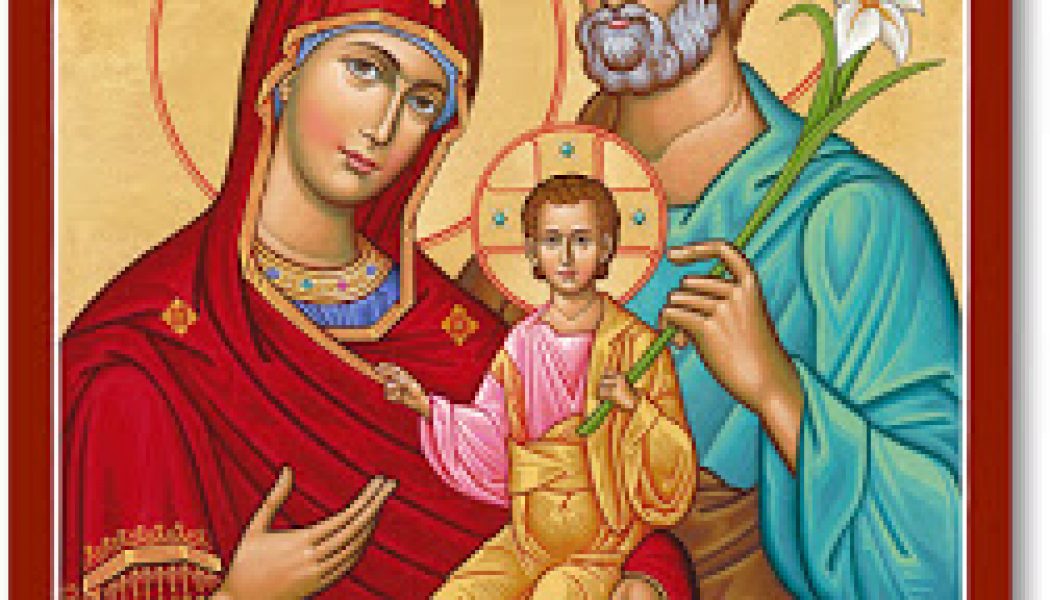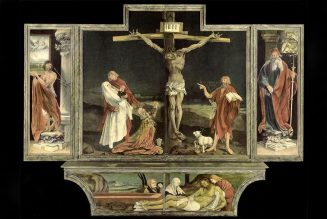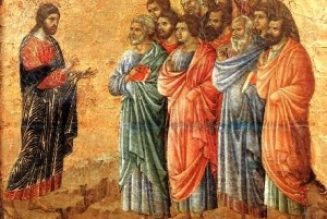Octave of the Solemnity of Christmas is dedicated to celebrating the Holy
Family. The Readings for this Sunday
focus on the rights and responsibilities of family members toward each other,
and the Gospel focuses on the role of the “most forgotten” member of the Holy
Family, St. Joseph, who cared for and protected the Blessed Mother and infant
Jesus through the dangerous early years of Jesus’ childhood.
a mother’s authority he confirms over her sons.
Whoever honors his father atones for sins,
and preserves himself from them.
When he prays, he is heard;
he stores up riches who reveres his mother.
Whoever honors his father is gladdened by children,
and, when he prays, is heard.
Whoever reveres his father will live a long life;
he who obeys his father brings comfort to his mother.
My son, take care of your father when he is old;
grieve him not as long as he lives.
Even if his mind fail, be considerate of him;
revile him not all the days of his life;
kindness to a father will not be forgotten,
firmly planted against the debt of your sins
—a house raised in justice to you.
wisdom books in the Catholic order of the canon, and may be regarded as a
massive summation of the Israelite wisdom tradition composed c. 200 BC. In fact, Sirach is truly a meditation on the
entire body of Israel’s Scriptures from the perspective of wisdom, that is, the
practical knowledge of successful living.
Because Sirach provides such a useful digest of the moral message of the
Old Testament Scriptures, the early Church used it heavily in catechesis,
earning it the name “Ecclesiasticus,” that is, “the Church book.”
practical advice—teaching people the application of natural virtues in daily
life. Early on, the Church realized that
it was difficult to catechize pagan cultures that did not practice the natural
virtues well. Theological virtues—faith,
hope, and love—rest upon and perfect the natural virtues—prudence, justice,
fortitude, and temperance. The Book of
Sirach was employed to form people in basic Judaeo-Christian morality and
family life. Leading a moral and
well-ordered natural life is, of course, not ultimate goal of the Christian
life—union with God is. However, it is
very difficult to make progress in union with God in the midst of immorality
and disorder.
Sirach frequently strikes us these days as quaint or dated. However, our modern alternatives to the moral
vision laid out in this book have not been empirically successful—by almost any
psychological or sociological measure, our culture is growing more unhealthy
and dysfunctional. Sirach has been
treasured in Christianity (and even in Judaism) for centuries because its
principles actually work.
Reading from Sirach focuses on the responsibility of children to revere their
parents. One’s relationship with one’s
parents affects one’s relationship to God: it preserves one from sin, merits
forgiveness of sin, and makes one’s prayers efficacious.
it easy to revere his father and mother, because they are virtuous and
admirable people! You are truly blessed
in body and soul. But many of us
meditating on these Readings struggle with this command to revere parents,
because we have been hurt by them: perhaps we are children of divorce, or were
abandoned my father or mother. Perhaps
we suffered abuse of some kind. How then
do we react to this Reading?
us. Our identity is so strongly bound up
with our parents that hatred of them becomes self-hatred, damaging us at the
core of our being. So for the sake of
our own health and the health of our relationship to God, we need to pray for
divine strength—what we call “Grace”—to forgive hurts that otherwise are beyond
our ability to forgive, and ask God to show us whatever was good, true, and
beautiful in our parents, in order that we may emphasize and dwell on that.
our neighbors as ourselves”? Aren’t we
conscious of ways we sinned against our own children, and don’t we hope they
will come one day to forgive our vices and emphasize our virtues? This Reading from Sirach is, in a way, an
application to the child-parent relationship of the principle of the Lord’s
prayer: “Forgive us our trespasses, as we have forgiven those who trespass
against us,” because “if you forgive men their trespasses, your heavenly Father
also will forgive you; but if you do not forgive men their trespasses, neither
will your Father forgive your trespasses. (Matt 6:14-15).”
First Reading especially commends honoring one’s father in his old age. These verses remind us of the times that Pope
Francis, like his predecessors, has emphasized that the moral measure of a
society—and we may add, of individuals, too—is how we treat the very old and
the very young, those who don’t seem to “contribute” very much to the
economy. This de-supernaturalized way of
evaluating human worth is contrary to the Gospel of Jesus Christ. The elderly deserve honor and care for their
own sake, as image-bearers of God.
Moreover, since there is an order to charity, those closest to us (like
our parents) have the first claim on our love.
Therefore, much later in salvation history, St. Paul will affirm: “If
any one does not provide for his relatives, and especially for his own family,
he has disowned the faith and is worse than an unbeliever” (1 Tim 5:8). Why “worse than an unbeliever?” Because he not only rejects, but discredits the Christian
faith.
(cf. 1) Blessed are those who fear the Lord and walk in his ways.
Blessed is everyone who fears the LORD,
who walks in his ways!
For you shall eat the fruit of your handiwork;
blessed shall you be, and favored.
R. Blessed are those who fear the Lord
and walk in his ways.
Your wife shall be like a fruitful vine
in the recesses of your home;
your children like olive plants
around your table.
R. Blessed are those who fear the Lord
and walk in his ways.
Behold, thus is the man blessed
who fears the LORD.
The LORD bless you from Zion:
may you see the prosperity of Jerusalem
all the days of your life.
R. Blessed are those who fear the Lord
and walk in his ways.
natural blessing that family life is.
One of the blessings God grants to the one who fears him is the joy of
married love and fruitfulness:
in the recesses of your home;
your children like olive plants
around your table.
possibility that person may sacrifice the great good of family life in order
more radically to be devoted to God through a life of celibacy (Matt 19:10-12).
But the person who gives up family life because he or she has contempt for
them, misunderstands the call to religious life. Marriage and family life are a great
good. They mirror the life of the
Trinity, since God Himself—Father, Son, and Holy Spirit—is familial in his
nature. “Father” and “Son,” after all,
are family terms. Apostolic celibacy
gains its value because it is the sacrifice of a great good (a spotless lamb)
in order more fully to dedicate this temporal life to God and to His
sacramental family, the Church.
life are not even perceived as desirable goods by many in our culture. Marriage rates are dropping and too often
children are perceived as a burden and distraction from our career or hobbies. Is that well-ordered? Is a job at some mindless corporation really a
greater eternal good than one’s own child?
We are very far from seeing reality through the eyes of God.
Put on, as God’s chosen ones, holy and beloved,
heartfelt compassion, kindness, humility, gentleness, and patience,
bearing with one another and forgiving one another,
if one has a grievance against another;
as the Lord has forgiven you, so must you also do.
And over all these put on love,
that is, the bond of perfection.
And let the peace of Christ control your hearts,
the peace into which you were also called in one body.
And be thankful.
Let the word of Christ dwell in you richly,
as in all wisdom you teach and admonish one another,
singing psalms, hymns, and spiritual songs
with gratitude in your hearts to God.
And whatever you do, in word or in deed,
do everything in the name of the Lord Jesus,
giving thanks to God the Father through him.
Wives, be subordinate to your husbands,
as is proper in the Lord.
Husbands, love your wives,
and avoid any bitterness toward them.
Children, obey your parents in everything,
for this is pleasing to the Lord.
Fathers, do not provoke your children,
so they may not become discouraged.
two main sections: the first concerns how to behave with the spiritual family
which is the Church, the second how to behave within the natural family, the ecclesia domestica, the domestic Church.
responsibilities of family members toward one another. “Wives, be subordinate to your husbands, as
is proper in the Lord.” This is because,
throughout Scripture, beginning with Adam in the Garden-sanctuary of Eden, the
ideal held up for the father and husband is to serve as the priest or spiritual
leader of the family, the domestic church.
To do this, he needs the support of his wife. He needs her both to expect and to respect him
as the “family priest,” as it were. The
children will take their cue from their mother.
If they see she does not respect her husband or look to him for
spiritual leadership, the family becomes disordered. Let’s remember the Blessed Mother, who—though
she was the sinless Mother of God—looked with respect on St. Joseph and honored
him as her husband.
is the responsibility of a husband and father, but one that is frequently
shirked. When I worked in urban
ministry, I encountered fathers who were willing to send their kids to Church or
youth programs, as long as they weren’t involved. I told them they’d do more for their children
by leaving the kids and home and coming to worship themselves.
the husband’s responsibility: “love your wives and avoid any bitterness toward
them.” A longer treatment of the
husband’s responsibility is found in the famous passage of Ephesians 5, that
likens the husband’s love of his wife to that of Christ for the Church. Thus, the model of Christ’s love even to a
sacrificial death is held out as normative for husbands. This is a high calling. It also rules out any abuse, any selfishness,
any chauvinism, any “machismo” on the part of the husband. Any such thing is a disorder incompatible
with the command to love one’s wife as Christ loved the Church. Though the husband many be the priest of the
domestic church, this is for him a role of service, not one of “lording it over
others” (see Luke 22:25-26).
children and fathers. “Children, obey
your parents in everything.” Of course,
this does not mean to obey parents in anything that is sinful. Obedience is always guided by the moral law
of God. In moral issues, “we must obey
God rather than men” (Acts 5:29). This
holds true also for sins against our person.
We are not called to submit to offenses against our person perpetrated
by one in authority.
good will of parents in this passage, and so says, “obey your parents in
everything,” knowing that parents typically have the best interest of their children
at heart, and that, moreover, willful disobedience just introduces chaos into
the home.
not provoke your children, lest they become discouraged.” Notice that he addresses fathers! He assumes that fathers take an active role
in the raising of their children, and of setting family policy! He assumes they do more than come home from
work and sit on the couch drinking beer and watching football! The role of the father is so important in
children’s development. Let’s not listen
to the lies of those who say the father can be replaced without harm: that is
bad science and bad theology. The father
who is a strong, loving, and directing presence in his children’s lives
contributes greatly to their spiritual and psychological health, and makes it
easier for them to find faith in a God who calls Himself “Father.”
the angel of the Lord appeared to Joseph in a dream and said,
“Rise, take the child and his mother, flee to Egypt,
and stay there until I tell you.
Herod is going to search for the child to destroy him.”
Joseph rose and took the child and his mother by night
and departed for Egypt.
He stayed there until the death of Herod,
that what the Lord had said through the prophet might be fulfilled,
Out of Egypt I called my son.
When Herod had died, behold,
the angel of the Lord appeared in a dream
to Joseph in Egypt and said,
“Rise, take the child and his mother and go to the land of Israel,
for those who sought the child’s life are dead.”
He rose, took the child and his mother,
and went to the land of Israel.
But when he heard that Archelaus was ruling over Judea
in place of his father Herod,
he was afraid to go back there.
And because he had been warned in a dream,
he departed for the region of Galilee.
He went and dwelt in a town called Nazareth,
so that what had been spoken through the prophets
might be fulfilled,
He shall be called a Nazorean.
that focuses on St. Joseph as the protagonist.
Let’s recall a few facts about such a great but overlooked saint. St. Joseph was of royal blood. In fact, he himself was heir to the throne of
Jerusalem: that is the point of the genealogy of Matthew 1. However, although he is the legitimate heir,
he has to flee from the imposter who actually sits on the throne: Herod, a
half-Jewish, half-Edomite aristocrat and politician who bribed, manipulated,
and married his way onto the throne of Israel.
Herod is one of the original anti-Christ figures of the Bible.
the royal line of the tribe of Judah, he’s named after the patriarch of a
different tribe, one that always rivaled Judah for leadership of the twelve
tribes of Israel (cf. Gen 49:10 & 26, NAB).
Like Joseph of the coat-of-many-colors fame, St. Joseph is particularly
open to communication from God, and receives revelatory dreams that involve
traveling to Egypt and preserving God’s people from harm.
history, the safety of the Holy Family and thus the preservation of the hope of
salvation for the entire human family is all in St. Joseph’s hands. Mary is immaculate, the child Jesus divine,
but like many good action flicks, at the moment of crisis the plot is all in
the hands of the one character who does not have “superpowers”! In this way St. Joseph is a type of the
believer: Jesus entrusts himself to us, he dwells within us through his Spirit
and the Eucharist. In a way, too,
through the communion of saints in the Spirit, the Blessed Mother dwells with
us (John 19:27). But how well do we
cherish the Lord and his mother who have been entrusted to us? Do we allow their life to flourish, such that
we can say, “It is no longer I who live, but Christ who lives in me?” (Gal.
2:20).
highlight about St. Joseph? What
qualities does it put forward as the virtues that made him successful in the
role to which God called him?
passage: (1) He was open to hear the
voice of God, and (2) he was prompt
in obedience.
open to hear the voice of God in our own lives usually requires certain habits,
among which we may list: (1) devoting adequate time to prayer, including
silence in prayer when we can let our heart be moved by God; (2) reading and
meditating on Scripture, through which God speaks to us; (3) the counsel of a
holy confessor or spiritual director; (4) the practice of penance and (at least
small) mortifications, through which we develop detachment from the material
goods and pleasures that often dull our spiritual senses.
us must lead to action, however. Some
spiritual writers say that God stops sending inspirations when we habitually
refuse to act on them.
for all Christian fathers in particular, and for all believers generally, of
how to hear God’s Word and obey it. St.
Joseph, pray for us!









